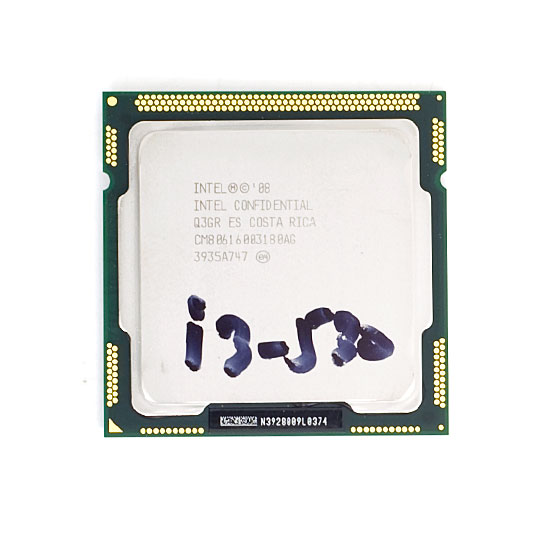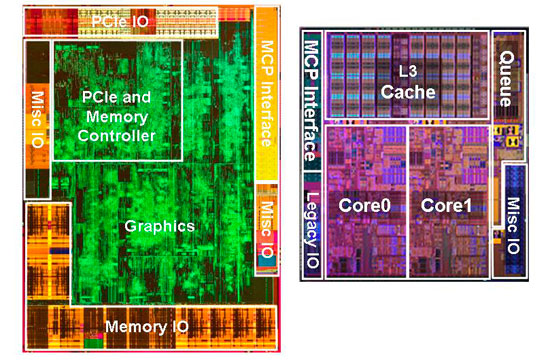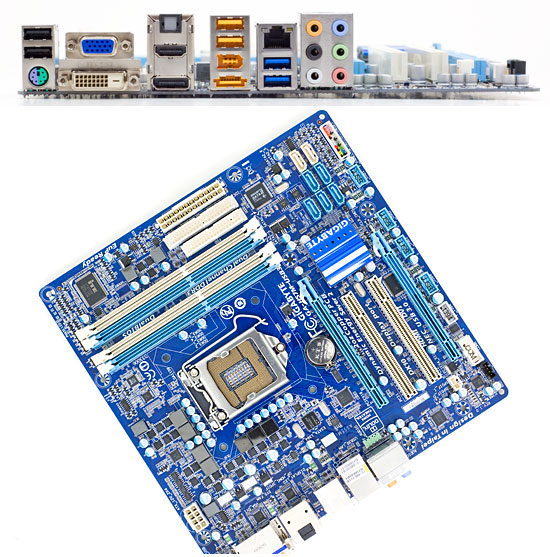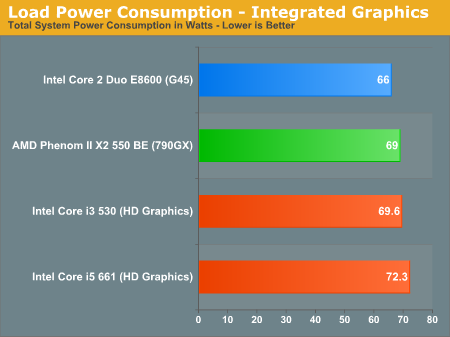The Intel Core i3 530 Review - Great for Overclockers & Gamers
by Anand Lal Shimpi on January 22, 2010 12:00 AM EST- Posted in
- CPUs
It’s about time we got an interesting value processor to review from Intel. I simulated one in our Clarkdale review, but today I’m bringing you a full review of the most interesting dual-core Westmere for the desktop - the Core i3 530.

Priced at $113 (and selling for about $125 on the street) the 530 runs at 2.93GHz and features no turbo modes. It’ll run at 1.33GHz at its lowest frequency, and no faster than 2.93GHz at full load. The missing turbo boost is almost all you sacrifice as the 530 still has a hefty 4MB L3 cache shared between both cores. Each core gets a 256KB 10-cycle L2, just like the i5s and i7s.
The un-core is clocked at 2.13GHz, down from 2.40GHz in the i5. That should hurt performance a bit compared to our simulated i3 in the launch article. Aside from Turbo the other thing you give up with the i3 is AES acceleration. Westmere's AES New Instructions (AES-NI) are disabled on all of the i3s in typical Intel fashion. There has to be some reason for users to opt for a Core i5 instead.
| Processor | Core | Un-core | GPU | Cores / Threads | L3 Cache | Max Turbo | TDP | Price |
| Intel Core i5-670 | 3.46GHz | 2.40GHz | 733MHz | 2 / 4 | 4MB | 3.76GHz | 73W | $284 |
| Intel Core i5-661 | 3.33GHz | 2.40GHz | 900MHz | 2 / 4 | 4MB | 3.60GHz | 87W | $196 |
| Intel Core i5-660 | 3.33GHz | 2.40GHz | 733MHz | 2 / 4 | 4MB | 3.60GHz | 73W | $196 |
| Intel Core i5-650 | 3.20GHz | 2.40GHz | 733MHz | 2 / 4 | 4MB | 3.46GHz | 73W | $176 |
| Intel Core i3-540 | 3.06GHz | 2.13GHz | 733MHz | 2 / 4 | 4MB | N/A | 73W | $133 |
| Intel Core i3-530 | 2.93GHz | 2.13GHz | 733MHz | 2 / 4 | 4MB | N/A | 73W | $113 |
| Intel Pentium G9650 | 2.80GHz | 2.00GHz | 533MHz | 2 / 2 | 3MB | N/A | 73W | $87 |
Sitting next to the 32nm CPU die is a 45nm GPU/memory controller:

Like the majority of the Core i5 processors, the GPU here runs at 733MHz. The exception being our recently reviewed 661 which runs the GPU at 900MHz for those who want that extra bit of mediocre gaming performance.
From Intel the closest competitor is the Core 2 Duo E7600, which runs at 3.06GHz but with a 3MB L2 cache. AMD provides the biggest threat with its Athlon II X4 630 and Phenom II X2 550 BE. The latter isn't on AMD's official price list but you can still find it online today for $99.
In a market full of good alternatives, whether it’s an ultra-cheap quad-core or a solid dual-core, it’s time to find out if there’s any value in the Core i3 530.
Fixes Since Last Time
There were two outstanding issues in our Clarkdale review that needed fixing after CES. First and foremost was power consumption. We incorrectly assumed that Clarkdale's idle power consumption was worse than Lynnfield due to the 45nm on-package chipset. As many of you pointed out, it was an issue with our ASUS H57 motherboard. After CES we switched over to Gigabyte's GA-HS57M-USB3 and the idle power consumption improved considerably. Since then ASUS appears to have fixed the problem but our data for this review was still run with Gigabyte's board.

Unfortunately these sorts of issues aren't rare with any new motherboard/chipset release. Our ASUS H57 board had idle power issues, while our Gigabyte H57 board had overclocking issues. No one seems to get it right on the first try.
The second issue that needs correcting is the system power consumption while playing back an x264 video using integrated graphics. Our AMD numbers were unusually high in our initial review, which we've since corrected:

While playing H.264 encoded video the GPU does all of the heavy lifting and there's no power advantage for Clarkdale to rest on. When watching a movie the AMD system is indistinguishable from our Clarkdale test bed.
We are still running into an issue with MPC-HC and video corruption with DXVA enabled on the 790GX, but haven't been able to fix it yet. Have any of you had issues with video corruption with AMD graphics and the latest stable build of MPC-HC for 64-bit Windows? Or should we chalk it up to being just another day in the AnandTech labs.










107 Comments
View All Comments
vol7ron - Saturday, January 23, 2010 - link
You increased the power .16V AND decreased the multiplier.It's nice to see the overclock that got, but could you be consistent in what you present us? I'd like to really know what made the overclock beneficial.
Please, be aware of your control group in your tests and at least give us one of the following:
1. (Stock Power + Stock Multiplier) vs. (Stock Power + [Lower] Multiplier)
2. (Stock Power + Lower Multiplier) vs. ([Higher] Power + Lower Multiplier)
3. (Stock Power + Stock Multiplier) vs. ([Higher] Power + Stock Multiplier)
Notice: in each test there is only one thing that changes (in the brackets).
That will help answer my question: Can the i3 530 overclock to ~4000MHz at a lower multiplier on stock power?
vol7ron
Minion4Hire - Sunday, January 24, 2010 - link
I think it was implied (or just directly stated) that he was unable to overclock the 530 past 3.3 GHz in any manner until more voltage was applied. That could just be an "anomaly" of sorts with their 530 so it's probably best not to dwell on it. If you actually intend to buy and overclock the 530 you'll figure it out then. The small details and mindless minutiae really don't matter. It can hit 4 GHz with relative ease; What more could you ask for?vol7ron - Sunday, January 24, 2010 - link
I took that to mean 3.3GHz was the highest he got at a stock multiplier. If what you say is correct, it'd be nice to see the highest overclock out of the box (stock power/multiplier) -- a benchmark is needed."If you actually intend to buy and overclock the 530 you'll figure it out then."
- I will give you time to retract this statement, since it is the most ignorant thing I've heard regarding a review site. After all, AnandTech.com's subtitle: "your source for hardware analysis and more." If overclocking CPUs is not part of hardware analysis, then I invite you to leave. When determining an i3 vs i7 buy, overclocking makes a big difference, especially on stock power.
AssBall - Monday, January 25, 2010 - link
If you think comparing a 300 dollar cpu to a 120 dollar one is relevent, then I also invite your egotistical ass to leave. It was a good article, and you are just trolling.Set up your own multinational hardware site, then come and spout your anal retentive horse shit.
jigglywiggly - Friday, January 22, 2010 - link
anandtech, you want to give me onelanvince - Friday, January 22, 2010 - link
???????~~I would like to own one franklyformulav8 - Friday, January 22, 2010 - link
Anand, I'm not sure why you keep saying Intel has better integrated graphics than nvidia, and even amd.Your own results shows the AMD graphics besting both the i3 and the i5 660. AMD wins 3 and Intel wins 2. 1 is a tie.
Also it appears where the i660 loses, it loses by quite a lot. AMD loses one test up to 20% and the other is about 15%. Intel loses up to 30% and almost 30% in another.
So whats the deal? Am I simply reading your graphs wrong? And when you think about it, Intels graphics having direct mem controller access and still can't truly beat nvidia/amd is pretty sad you have to admit.
But one thing is for sure. AMD cpu's is now behind in the lower midrange area in quite a few areas. The best thing is you can get $50 mobo's for AMD. Intel boards still cost more even including rebates, unless things has changed recently...
Jason
Penti - Sunday, January 24, 2010 - link
He's not saying that. He just implies it's a better platform and that it's better for HTPC. It's really good enough if you don't game, so why the fuss? No IGP is really gameable. He has already implied that it might change with 880/890 integrated graphics.0roo0roo - Tuesday, April 20, 2010 - link
I just find that the more cores feels much more responsive to general system use while doing such encoding tasks compared to a core 2, so i have doubts they can be compared so simply/synthetically.Ronstar - Thursday, May 20, 2010 - link
HiI bought a PC with an I3 2.93ghz 1GB CPU and would like to upgrade the Graphic card. I do not know if their is a correlation between the power if the CPU and what graphic card would work well, but I assume that a bottleneck could happen at the CPU in which case I would not benefit from a very high powered graphic card capabilities. then maybe I am wrong......
Could someone please advise what the best graphic card is that would be worth upgrading too?
thank you plenty
Ron